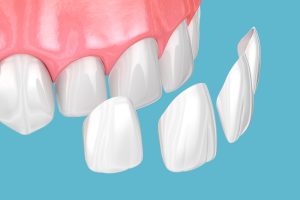Rediscover Love for Your Smile With Composite Veneers
Are you ready to smile with complete confidence? Rediscover the love you have for your smile with composite veneers. You can turn your smile dreams into a reality with composite resin veneers.
Learn about this cosmetic dental treatment with ourcosmetic dentist inour dental office inNorthampton, MA, below. Then, give ourHampshire County dental practicea call at (413) 387-4585to schedule an appointment. Please note we may not offer this service at our practice. Please call (413) 387-4585to learn more.
What Are Composite Veneers?
Composite veneers, also known as composite resin veneers or direct veneers, are tooth-colored shells applied to the front surface of teeth. They’re cost-effective, durable, and naturally beautiful.
A composite dental veneer can correct any of the following dental issues:
- Stained teeth
- Crooked teeth
- Misshapen teeth
- Chipped or broken teeth
- Gapped teeth
Direct Composite Veneers
Direct composite veneersare made of composite resin and applied directly to the teeth. It doesn’t take long for a dentist to prepare your teeth for the application of the veneers, and it’s a minimally invasive process.
Indirect Composite Veneers
Indirect composite veneersuse the same material as direct composite veneers, but the veneers are custom-created before placement. You’ll wear temporary veneers while you wait for the creation of your permanent dental veneers.
Composite Veneers Benefits
Benefits of composite veneers include:
- Less tooth enamel is removed than porcelain veneers
- The process can be completed in one visit to your dentist
- Cost-effective
- If damaged, they can be repaired easily
- Can correct various aesthetic problems, such as gaps, chips, and discoloration
Composite Veneers Procedure
The composite veneer procedure can be completed in just one visit to the dentist’s office. You’ll experience the following:
- Your dentist will start by cleaning your teeth and preparing them for veneer application. They may need to remove a thin enamel layer to help the material stick to your teeth.
- If you’re receiving direct veneers, the dentist will etch the enamel of your teeth to help with adhesion. Then, they’ll apply the adhesive to glue to help the composite material stick to your teeth. Very thin layers of the material are added to the surface of the teeth.
- The dentist will “cure” or quickly harden the layers of composite resin with light. You’ll be able to pick the shade or color you want for your veneers.
- With indirect veneers, your dentist will take a mold or digital impression of your teeth after the teeth have been prepared. Your veneers will be created in a lab, and in the meantime, you’ll be fitted with temporary veneers.
- When your permanent veneers are ready, the dentist will apply them by etching your teeth and then applying a type of adhesive material to your teeth. The adhesive will help the veneers stay in place.
- Your composite veneers will be placed on your teeth and you’ll have a brand new smile.
Caring for Composite Veneers
Maintaining your composite veneers is as easy as caring for your natural teeth. To increase the longevity of your veneers, do the following:
- Keep a consistent oral hygiene routine that includes brushing and flossing regularly
- Avoid stain-causing food and drinks
- Consistently visit your dentist for checkups and dental cleanings
- Avoid hard foods and bad habits, such as chewing ice
Composite Veneers vs. Porcelain Veneers
Composite veneers and porcelain veneers are different forms of dental veneers that can be used to improve the appearance of your teeth, but there are some key differences between the two, including:
- Material: Composite veneers are made from a resin similar to tooth-colored fillings. Porcelain veneers are made from a ceramic material that’s baked in a lab, creating a more durable and stain-resistant veneer.
- Procedure: Composite resin veneers are often applied in a single appointment. Porcelain veneers typically require at least two appointments.
- Aesthetics: Porcelain veneers generally have superior aesthetics, with a translucency that closely mimics natural tooth enamel. Composite resin veneers are still aesthetically pleasing but may not have the same depth of color and translucency.
- Durability: Porcelain veneers are more durable, lasting up to 10 to 15 years, while composite veneers typically last between five to seven years.
- Cost: Composite veneers are generally less expensive than porcelain veneers.
- Reversibility: Composite veneers are generally more reversible than porcelain because they require less, if any, removal of tooth structure.




